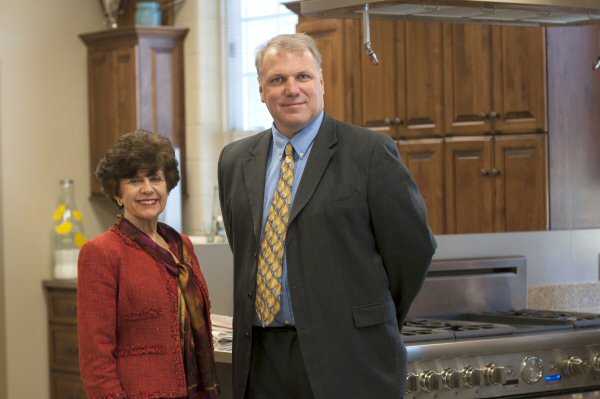Students benefit from Carson-Newman University and BSH partnership

Dr. Kitty Coffey, who chairs Carson-Newman’s Family and Consumer Science Department, stands with Russell Dorsten of BSH in the University’s foods and nutrition lab. The lab, fully-equipped with BSH’s Thermador and Bosch appliances is a result of a thriving relationship shared between the University and BSH. Because of the partnership, Carson-Newman FCS students gain hands-on experience with industry-leading equipment.
From Dr. Kitty Coffey’s standpoint, Carson-Newman University’s Family and Consumer Science (FCS) Department is one of the luckiest in the country.
“I brag to colleges in FCS that we are probably the only program in the country that when we have an appliance malfunction we don’t call a simple technician, we call an engineer,” said the chair of the University’s Family and Consumer Science Department.
That engineer, who on more than one occasion has been flown in from California, works for BSH home appliances, one of the top three world’s leading manufacturers of high-end home appliances. Consumers may recognize the company better by one of their three brands: Bosch, Thermador, and Gaggenau, which are manufactured stateside in New Bern, N.C. and nearby in LaFollette, Tenn.
Several hundreds of thousands of dollars-worth of their equipment are housed at Carson-Newman as a gift from BSH to the University. From high-end Thermador ranges to refrigerators and ovens, every appliance in the department’s foods and nutrition lab, located in Blye-Poteat Hall is a top-of-the-line BSH product.
Russell Dorsten, BSH senior vice president for North America’s product divisions cooking and refrigeration, estimates that the total gift reaches close to half a million dollars over the course of their approximate five-year relationship with the University.
“We try to support the communities where we have people work and live,” Dorsten said.
Dorsten was on campus recently to speak with undergraduate family and consumer science and business students. The visit was student-focused, as Dorsten imparted just a bit of the wisdom to the next generation of business and industry leaders. Topics included resumes, interviews and the simple yet powerful impact of a well-dressed applicant.
“It is an opportunity to give back and maybe take out a few speed bumps along the way,” added Dorsten about his time on campus.
One of only two Americans in upper management with BSH, Dorsten and his employer know the importance of investing in education.
Neither Dorsten nor BSH have direct ties to the University save one former consumer scientist who happened to be both a Carson-Newman alumna and BSH employee.
Now an adjunct professor with the University, Beverley Hammond is the single strand that connected the two entities. When the University was constructing Blye-Poteat Hall in 2006, Hammonds was still working for BSH. She thought her employer might want to have a hand in the growing Carson-Newman’s FCS program, located in its own backyard. The response exceeded everyone’s expectations.
“This has enhanced our program,” Coffey said. “Equipment makes a difference. You could have all the theory in the world, but you have to have the equipment in which to apply that theory.”
Thanks to BSH, Carson-Newman now boasts one of the most well equipped professional consumer science labs, gaining recognition from the American Association of Family and Consumer Sciences and identifying the program nationally.
The relationship, which outfitted not only the Blye-Poteat lab, but also C-N’s Duncan Hall-Cooperative Management and Housing Lab, and home appliance needs in the Ken Sparks Athletic Complex, is symbiotic.
“We want feedback,” Dorsten said. “We listen.”
Dorsten says the feedback from students and consumers goes directly in new equipment.
“Because Carson-Newman has consumer sciences and dietetics and pairs that with interior design, we were interested,” he said. “Interior design and consumer science majors will be responsible in the future for designing our kitchens….We wanted to partner with that.”
Carson-Newman University is a private, Christian liberal arts university. Founded in 1851, Carson-Newman is located in Jefferson City, Tennessee, among the foothills of the Great Smoky Mountains. The University has approximately 2,000 students and offers 50 undergraduate majors and nine graduate degrees. The institution’s website is www.cn.edu<http://www.cn.edu/>










